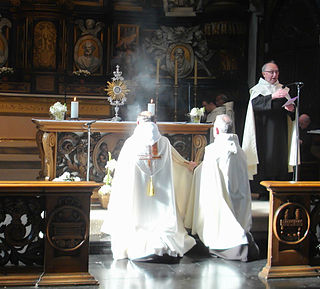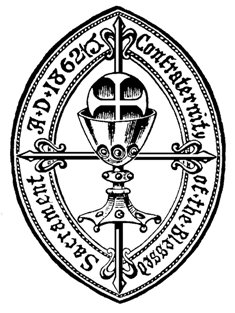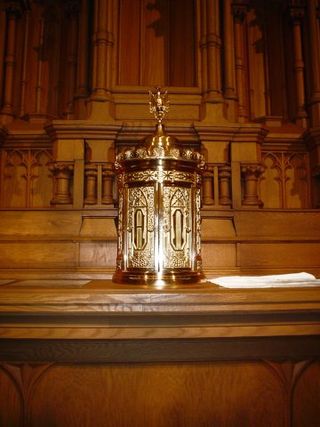
All Souls' Day, also called The Commemoration of All the Faithful Departed, is a day of prayer and remembrance for the faithful departed, observed by certain Christian denominations on 2 November. Through prayer, intercessions, alms and visits to cemeteries, people commemorate the poor souls in purgatory and gain them indulgences.

Allhallowtide, Hallowtide, Allsaintstide, or the Hallowmas season, is the Western Christian season encompassing the triduum of All Saints' Eve (Halloween), All Saints' Day and All Souls' Day, as well as the International Day of Prayer for the Persecuted Church and Remembrance Sunday in some traditions. The period begins on 31 October annually. Allhallowtide is a "time to remember the dead, including martyrs, saints, and all faithful departed Christians." The present date of Hallowmas and thus also of its vigil (Hallowe'en) was established for Rome perhaps by Pope Gregory III (731–741) and was made of obligation throughout the Frankish Empire by Louis the Pious in 835. Elsewhere, other dates were observed even later, with the date in Ireland being 20 April. In the early 11th century, the modern date of All Souls' Day was popularized, after Abbot Odilo established it as a day for the monks of Cluny and associated monasteries to pray for the dead.

Walsingham is a civil parish in North Norfolk, England, famous for its religious shrines in honour of Mary, mother of Jesus. It also contains the ruins of two medieval monastic houses. Walsingham is 27 miles (43 km) northwest of Norwich.

The communion of saints, when referred to persons, is the spiritual union of the members of the Christian Church, living and the dead, but excluding the damned. They are all part of a single "mystical body", with Christ as the head, in which each member contributes to the good of all and shares in the welfare of all.

Eucharistic adoration is a Eucharistic devotional practice primarily in Western Catholicism, but also to a lesser extent in certain Lutheran and Anglican traditions, in which the Blessed Sacrament is adored by the faithful. This practice may occur either when the Eucharist is exposed, or when it is not publicly viewable because it is reserved in a place such as a church tabernacle.

A paten or diskos is a small plate, used during the Mass. It is generally used during the liturgy itself, while the reserved sacrament are stored in the tabernacle in a ciborium.

The Society of Mary is an Anglican devotional society dedicated to and under the patronage of Mary, mother of Jesus. As its website states, it is a group of Anglican Christians "dedicated to the Glory of God and the Holy Incarnation of Christ under the invocation of Our Lady, Help of Christians." The Anglican Society of Mary is not to be confused with the two Roman Catholic religious orders of the same name commonly called the Marists and the Marianists.

Marian devotions are external pious practices directed to the person of Mary, mother of God, by members of certain Christian traditions. They are performed in Catholicism, High Church Lutheranism, Anglo-Catholicism, Eastern Orthodoxy and Oriental Orthodoxy, but generally rejected in other Christian denominations.

Benediction of the Blessed Sacrament, also called Benediction with the Blessed Sacrament or the Rite of Eucharistic Exposition and Benediction, is a devotional ceremony, celebrated especially in the Roman Catholic Church, but also in some other Christian traditions such as Anglo-Catholicism, whereby a bishop, priest, or a deacon blesses the congregation with the Eucharist at the end of a period of adoration.

The Confraternity of the Blessed Sacrament (CBS), officially the Confraternity of the Blessed Sacrament of the Body and Blood of Christ, is a devotional society in the Anglican Communion dedicated to venerating the Real Presence of Christ in the Eucharist. It has worked to promote the Mass as the main Sunday service in churches, regular confession, and the Eucharistic fast. The society's motto is Adoremus in aeternum sanctissimum sacramentum, or in English, "Let us forever adore the Most Blessed Sacrament".

During the Mass of the Faithful, the second part of the Mass, the elements of bread and wine are considered to have been changed into the veritable Body and Blood of Jesus Christ. The manner in which this occurs is referred to by the term transubstantiation, a theory of St. Thomas Aquinas, in the Roman Catholic Church. Members of the Orthodox, Anglican, and Lutheran communions also believe that Jesus Christ is really and truly present in the bread and wine, but they believe that the way in which this occurs must forever remain a sacred mystery. In many Christian churches some portion of the consecrated elements is set aside and reserved after the reception of Communion and referred to as the reserved sacrament. The reserved sacrament is usually stored in a tabernacle, a locked cabinet made of precious materials and usually located on, above, or near the high altar. In Western Christianity usually only the Host, from Latin: hostia, meaning "victim", is reserved, except where wine might be kept for the sick who cannot consume a host.
Purgatorial societies are Roman Catholic Church associations or confraternities which aim to assist souls in purgatory reach heaven. The doctrine concerning purgatory, the condition of the poor souls after death, the communion of saints, and the satisfactory value of our good works form the basis of these associations.
Anglican Marian theology is the summation of the doctrines and beliefs of Anglicanism concerning Mary, mother of Jesus. As Anglicans believe that Jesus was both human and God the Son, the second Person of the Trinity, within the Anglican Communion and Continuing Anglican movement, Mary is accorded honour as the theotokos, a Koiné Greek term that means "God-bearer" or "one who gives birth to God".

A confraternity is generally a Christian voluntary association of laypeople created for the purpose of promoting special works of Christian charity or piety, and approved by the Church hierarchy. They are most common among Roman Catholics, Anglicans, Lutherans and the Western Orthodox. When a Catholic confraternity has received the authority to aggregate to itself groups erected in other localities, it is called an archconfraternity. Examples include the various confraternities of penitents and the confraternities of the cord, as well as the Confraternity of the Rosary.

Anglican devotions are private prayers and practices used by Anglican Christians to promote spiritual growth and communion with God. Among members of the Anglican Communion, private devotional habits vary widely, depending on personal preference and on their affiliation with low-church or high-church parishes.

Spiritual communion is a Christian practice of desiring union with Jesus Christ in the Eucharist. It is used as a preparation for Mass and by individuals who cannot receive holy communion.
The Catholic societies of the Church of England are associations within the Church of England which follow in the tradition of Anglo-Catholicism. They may be devotional, theological or pilgrimage-focused in nature. Many trace their origins to the Catholic revival in the Church of England which started with the Oxford Movement in the 19th century.
St Mary and All Saints Church is the parish church of Little Walsingham in the English county of Norfolk. It is dedicated to the Virgin Mary and All Saints. Little Walsingham was the location of the shrine of Our Lady of Walsingham, destroyed at the Dissolution. The Anglican shrine was revived by Alfred Hope Patten, the Vicar of Little Walsingham, in 1922, and the image of Our Lady of Walsingham was in the church until its translation to the new priory in 1931.
Albert Ernest Frost was an English Anglican priest who was persecuted for Anglo-Catholic practices in Australia. He subsequently returned to England and became an Anglican Benedictine and a noted spiritual writer.















